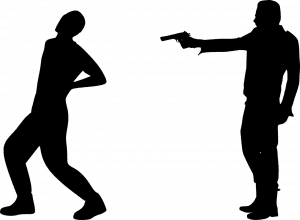
Pope St. John Paul II tried to prevent the Iraq War, but President G.W. Bush would not listen. The Pope made it clear, especially through Cardinal Pio Laghi, that there were no just grounds for war; whatever good intentions Bush might have had, they were overshadowed by the injustice of the invasion itself. Some tried to justify the war, saying that even if it preemptive in nature, it was actually a defensive war, that the United States was feeling threatened by Iraq. Nonetheless, “preemptive wars” fail to meet the criteria for wars to ever be considered justified, as Cardinal Ratzinger indicated when asked about them. The Catholic Church had long made it clear, not only should war be a last resort (which would not happen with a preemptive strike), many other criteria were necessary for a particular wat to ever be justified.[1] Thus, if war is ever necessary, it should be properly demonstrated. Actions should be defensive, not offensive, in nature. They must be done in order to promote the greater good. They must be limited, not excessive. They must work to bring the war to a just conclusion. Moreover, a competent authority is necessary for the declaration of war (it is not something just anyone can declare). And within the war itself, all actions should be done in order to serve justice and peace; that is, those involved in the war must always seek to do what is good and not use war as an excuse to commit atrocities. While war might require soldiers to kill, they must do all they can to kill only combatant (killing civilians is never justified). Traditionally, soldiers in just wars, even if they followed the moral guidelines associated with just wars, were still seen in need of penance and grace if they killed someone during war, showing that all killing, even if justified, left its mark on the soul. War, especially the death associated with war, is always a thing of sorrow, and this is something which we should always recognize if we are not to glorify death. If this is true for those killing others in a just war, it is even more true in wars which are not justified, even as it is also true in regards to the actions and reactions of people outside of war situations. Defensive killing is never a thing to celebrate.
Sadly, our society seems to glorify death; we celebrate brutality in war, and so we should not be surprised at the brutality which meets us in the streets. We justify aggressive wars, claiming that the best defense is an offense, so that all aggression is capable of being labeled defensive. Is this not how and why many vigilantes are able to kill and claim self-defense? They claim they were afraid and so their reactions were defensive, and because juries believe them in saying they were afraid, they believe them when they say they were acting out of self-defense. And yet, just as with the war in Iraq, the claim is not justified, because it is clear, they were the aggressors, looking, as it were, for a fight. Sadly, we as a society, thanks in part, to the example of the United States itself, have grown to accept such a strategy to justify killing, and since those who are dead cannot counter the claim being made after the fact, it should not be surprising that vigilantes end up being declared “not guilty” in a court of law. Society has been groomed to accept violence, and with it, aggression and provocation are not seen as problems when a killer claims self-defense. And with that grooming, not only do we accept such bloody killings, we often celebrate them, with the vigilantes being turned into heroes.
Christians should know better. Christians should know all death is a shame, all killing leaves a stain on the soul of the killer. David could not build the Temple because of the killing he did throughout his life. Jesus promoted non-violence, and Paul said we are not to resist evil with evil but with the good. We should not glorify violence, and we should recognize, even if self-defense proves justified in a particular situation, the one who has engaged such violence still has the taint of death on their soul. They are not to be applauded for what they have done. If, however, someone can be shown to have provoked the situation, they certainly should be held responsible for what happens. It is rather silly for someone to claim self-defense if their actions could lead the person they killed claim the same thing.
Social injustice breaks down societies, and when it does so, chaos ensues. As we see more and more deadly violence around us, we must realize at the root of it all is the way we have glorified violence and found ways to justify it. We, indeed, say that sometimes killing people is good – is that not the message we give when the death penalty is employed? And if we say killing people can be a good, then we should not be surprised when some, agreeing with such a sentiment, go out in the world and kill. They always have reasons. No one does it because they think they want to be the bad guy; they do it because they believe they have just cause and so the right to embrace the good which is found in killing others. We must dismiss the notion that killing is ever a good. We must recognize all killers, even if it is proven they have reasons for their actions, sin, and in that sin, need to do penance. We must end the notion that killing can ever be said to be good. Otherwise, we risk things spiraling out of control, as more and more people will accept that killing is a good which not only should be embraced, but put into practice.
[1] Saying a war is justified is not the same thing as to say it was good; indeed, to need justification as such should be seen as indicating the reverse, that war is never a good thing.
Stay in touch! Like A Little Bit of Nothing on Facebook.
If you liked what you read, please consider sharing it with your friends and family!













